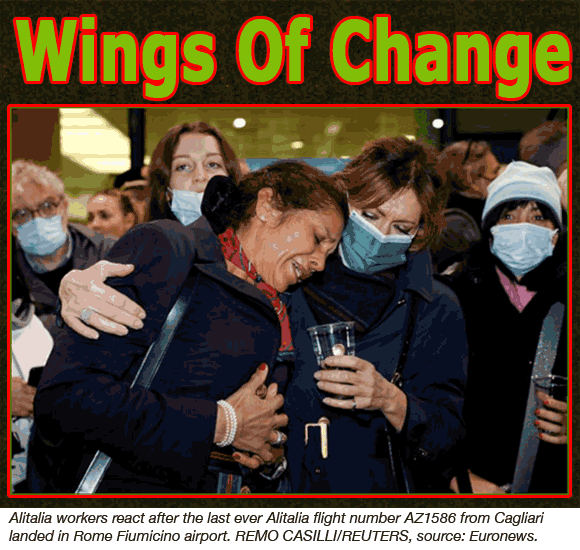 |
When I was very young I saw my linguistic
aptitude as an advantage in the fascinating, cosmopolitan world
of airlines. Just after college, I sent my application as flight
attendant to Alitalia. To my surprise, the entire interview, which
took place a few months later, was held in Italian and my language
skills were not examined. The examiner’s first question was:
“who suggested you should apply for this job?” Clearly
there had been no “suggestion” for me, so my application
remained unfulfilled. I have happily worked in logistics and freight
for the rest of my life.
My ‘would-have-been’ employer
Alitalia is now officially defunct and this actually means no joy
for anybody. My intuition is that today’s mourning is only
one in many and perhaps not even the last one, considering the phoenixlike
nature of the animal. Geoffrey and I exchanged some thoughts about
this epilogue (?) of the Alitalia saga, which is aptly summarized
by the photo published by Euronews
shown above.
Geoffrey was wondering why he felt
so romantically involved with AZ. He recalled the historic first
Italian fliers’ epic flights when Italo Balbo flew to the
Chicago World’s Fair in 1933 with two dozen flying boats.
One should honour Italian aviation for such feat as well as others.
Carina Massone Negrone’s achievements come to mind. She splendidly
honoured Italian aviation with her premières in the face
of fascists’ idea that women should become “the angels
of the hearth” and leave the rest of the world to men. RAI
Storia, definitely a TV channel worth watching for anyone who understands
Italian, recently celebrated Carina’s incredible achievements
in a special review.
Geoffrey also recalls some cargo workers
living in a container outside Hangar 6 at JFK where AZ Cargo operated.
As AZ employees they were on strike for what seemed like years back
in the 1990s. Eventually the strike, after a couple years, was settled
and everyone knew the trouble with AZ was that no one ever lost
their job or something along those lines. “I wonder if the
Italian style that lived so high in the air might be part of the
story? Maybe too much of La Dolce Vita?” said Geoffrey. Perhaps
Geoffrey is not far from the truth, but the picture is far more
complicated. If you wish to continue reading you will get an idea
of what I am talking about.
The good (?) news is that ITA, the
new Italian carrier starts with 52 jets and 2,800 employees, with
a state investment of €1.35 billion euros in three years. This
is about half of the wings and 1/3 of the staff that Alitalia employed
recently. The future of the other workers will be covered by a temporary
lay-off scheme paid by the government (i.e. Italian taxpayers),
as customary in any previous move of such importance that Alitalia
had undergone in seven decades. Watching TV in Italy you could be
moved by the poetic statements made by a young lady
quoting Antoine Saint-Exupery’s Little Prince, which was
shown on TV starting Oct 15th, i.e. the take off day of the new
airline, ITA. I was not moved and the cliché feeling prevailed.
This is a story I have heard so many times in my life I am getting
tired of it.
Going back to Euronews, their article
summarized Alitalia’s epilogue with the following title: “Plagued
by politics and private investors”. One could add that trade
unions had been giving their valuable contribution to the disaster
for many years, perhaps thinking that defending Alitalia workers’
interests was a battle to be fought indefinitely using taxpayers’
money in the face of common sense, but this does not work as we
all know. Following this trajectory through the years one gets the
picture that lifting a service company above market rules and expecting
it to survive through subsidies is never a good idea. Obviously
this is just my opinion. After reading the facts below, our readers
would be able make their own judgement.
Let us start from the end. After a
number of years in bigger or smaller trouble, Alitalia ceased to
exist as an operational carrier in October 2021, after 74 years
in the air. As usual this happened in the middle of harsh political
dispute. "Today we are losing another jewel, a company that
has forged the history of our nation and ... made us proud to be
Italian," said the far right, opposition party leader Giorgia
Meloni. Perhaps it was a jewel, in my view one whose cost was far
greater than its value.
In recent times Etihad had realized their
hopes were not coming to fruition and decided to ditch the expensive
endeavour started in 2014, without forgetting to take back the London
Heathrow slots that Alitalia had been using. In any case Etihad
was not the only suitor in the many years Alitalia spent looking
for external support. Air France, KLM, Lufthansa, Delta and many
others were falling in love with the idea of buying a room with
the view of the Colosseum.
In particular, two attempts were interesting
from my point of view and they both stemmed from the same chain
of thoughts: KLM and Air France both wanted to expand southward.
Talks with KLM started earlier, even before the times when Mr. Bisignani
was IATA’s boss. I knew talks had come so far as to moving
staff from Rome to Amsterdam and vice versa. KLM saw the strategic
development of having a hub in the north of Europe and another one
in the south, actually right in the middle of the Mediterranean.
I thought then and, to some extent, I still think it was a good
idea. In fact, the merger never happened.
The same thought came to mind to Mr.
Spinetta, the almighty principal of Air France, which flirted with
Alitalia beginning in 2001 and was now merging with KLM. This agreement
could have saved Italian taxpayers several years of indebtedness
and was the best agreement in terms of saving jobs (it included
a guarantee to pay salaries for seven years!).
But since July 2002 the EU Commission was
casting doubts about the possible marriage between Air France and
Alitalia and the meandering hostility was actually never lifted.
Mr. Prodi, then at full steam in Italian politics, was ambivalent
at best in his approach to Alitalia, but things change fast in Italian
politics. In 2008 Prodi lost the election to Mr. Berlusconi,
who launched the “courageous captains” adventure. If
we ignore the considerable bill that the state had to absorb, it
regularly ended into nothingness. The bill Italians had to foot
was anyway considered as state aid by the EU Commission, with tangible
reprimands for the state at fault. Who was at fault? Italy.
According to La Repubblica, the three “courageous
captains” were Messrs. Benetton, Ligresti and Gavio. Those
informed about Italian affairs know that soon enough Mr. Ligresti
had to face trouble in court for other mergers and the Benetton
group (inter alia behind Autostrade per l’Italia, detaining
over half of the money making Italian motorways), was recently at
the centre of a dispute which erupted after the collapse
of the Motorway Bridge “Morandi” in Genoa on August
14, 2019. Mr. Gavio, another motorway concessionaire, rarely hits
the news. Despite the almost limitless amount of cash that Italian
(and foreign) motorway users pour into the various concessionaires,
Alitalia did not manage to take off from the troubled waters in
which it had paddled for so long.
If memory does not fail me this is
also the time when a new Alitalia business plan was prepared, which
was kept somewhat far from the limelight. There appeared the intention
to absorb the main competitor (Air One) and consequently reconsider
Alitalia’s commercial offer. The evaporation of the main competitor
in the domestic market would have “qualified” Alitalia’s
revenues by some 36% (source: Il Sole 24 Ore). In the scheme cargo
operations had to go, together with maintenance, call centres, and
other ancillaries, allegedly in order to concentrate on the core
business.
Alitalia was not alone in making such plans.
In those years I was flying SN Brussels to Turin at €15 and
when they had no seat for me I could use Virgin Express almost just
as cheaply. Then both merged into Brussels Airlines, eventually
with Lufthansa in its DNA. The tickets were then “qualified”
also on this route. When I told the EU Competition authority that
in my view the move was bad for customers for the intervening lack
of competition, they replied that the merger had taken place within
Belgium, thus outside of their scope.
Considering there had never been a
passenger service between Brussels and Liege, Charleroi or Antwerp,
my opinion remained unchanged: the merger had international consequences
by its own nature, none in Belgium. In the end Lufthansa also swallowed
Air One in Italy: the EU aviation market was slowly changing before
our eyes. Alitalia was still struggling; but its two suitors Air
France and KLM whom initially Alitalia contributed to acquaint,
after the Commission authorized their merger in 2004, eventually
married, forgetting about their individual plans to conquer Rome.
Alitalia continued dealing with its own ailments and persevered
in the strategy of making ends meet in the room of politics rather
than on the tarmac. The rest is in the latest news.
Just to give you an idea of what kind
of ailment we are talking about, if you google the Italian expression
“crisi Alitalia”, which means something like “Alitalia
in trouble”, you get evidence that Alitalia was created in
1947, just after WWII and started its first “crisi”
in 1952, when I was born, then in 1965, 1971, 1974, 1978, 1982,
1986, 1991, 1993, 1997, 2002, 2003, 2004, 2005, 2006, 2007, 2008
. . . then I gave up checking, as it was clearly
no longer a “crisi” situation, rather a persistent inability
to remain in business, if not rescued by public money. At least
that is my understanding.
In 2002 Alitalia was actually profitable,
93 million, but some observed that was due to the money paid as
severance by KLM. More or less at that time Fausto Cereti signed
an agreement in Moscow to make Fiumicino the technical hub for Aeroflot.
Some thought this was just the beginning of an agreement with Russia
to open new windows in the East, forgetting that Moscow was hitting
Alitalia with fines to keep it small in Russia, just as well as
SAS, Finnair and KLM learned at their own cost. In 2003 Berlusconi
himself imposed his decision to stop redundancies, but in 2004 another
plan was adopted to deal with the umpteenth “crisi”.
This agreement with trade unions expected 289 pilots, 2,490 ground
and 900 flight assistants to be made redundant. In other words,
3,679 employees would be paid by taxpayers’ money rather than
air fares. Another way of looking at this: in September 2003 La
Repubblica published a report where it was clear that 48% of Alitalia’s
flight attendants had “strategically” called in sick,
causing the cancellation of 175 flights. Difficult to tell where
the origin of all this trouble is to be found, surely it is just
as difficult to appreciate the value of any of the rescue plans.
In hindsight they all lacked vision and courage, but hindsight is
the cheapest ware on the market.
I am wondering what Mr. O’ Leary
would have thought about employing two employees on the ground for
each one flying, 48% of them actually on the ground sick. Fact is
that many direct domestic connections are now exploited by Ryanair
within Italy. One may like Ryanair or not, but the service exists
and if you book early enough you may travel cheaply, if not comfortably.
For years instead Alitalia had privileged the Malpensa and Fiumicino
hubs also for domestic service, thus obliging its own passengers
to stop and spend more time in the air and in the airports than
any other carrier flying within the country.
It would be difficult to imagine other
governments in the acrobatics that kept Alitalia afloat in the years.
Italian politicians, save in the period of fast development which
started after WWII and lasted until 1964, were regularly bailing
Alitalia out of trouble. Each time the scheme was repeating itself:
a large amount of workers is made redundant, trade unions strike
for better working conditions, politicians impose new aficionados
of theirs and these get employed at Alitalia in large numbers to
please the unions. Then Alitalia starts making losses again, gets
rescued by making other people redundant, etc. the scheme repeats
itself. Of course this is far from intentional, what is missing
is the objective (or courage) to break the wicked cycle once it
is observed.
From other points of view, it is difficult
to believe that certain moves were not intentional, e.g. in 2008’s
bailout called operazione fenice (Phoenix Procedure) the resurrected
carrier confirmed most of the previously appointed managers, who
had assisted Alitalia out of its own business and they bought back
nearly the entire fleet, among which were 23 MD DC9s, not the epitome
of innovation at that time. In the same year a think-tank (Bruno
Leoni) calculated that rescuing Alitalia would increase Italian
aviation costs by €3 billion euros.
One wonders whether this year 2021
is the time when this endless scheme suddenly comes to halt, or
the phoenix will resurrect again from its own ashes. Alitalia was
not the only industry suffering from this disease, but it was probably
the enterprise where this situation peaked and produced the biggest
controversy at all levels, even abroad.
In 1964 I was a kid from Turin, the
city of FIAT. I was keeping myself busy with statistics and graphs
in which I was trying to compare the industrial development of Italy
and Japan. Both countries emerged in tatters after the war but development,
in particular in the automotive sector, was very fast until 1964.
Then we had our first “crisi” and our fast development
took a nose dive; in the following years we could only see Japan’s
contrail far away. In a row we aligned the “autunno caldo”
(hot autumn, i.e. a long strike period), then the first and second
petroleum crises. The period of Mr. Craxi at the helm of the state
followed and that is when Italians were told they had become rich
and could spend: we managed to create one of the largest public
debts in the world and we keep paying for it until this very day.
So after 1965, which is the first
Alitalia “crisi” that I can remember, there has never
been the money to bail Alitalia out of trouble; yet this is what
has happened so many times, until October 2021, amid the tears of
the last employees. Years before, some of these employees would
have easily made you feel sorry that you had pressed the button
of the overhead compartment.
Time will tell whether Alitalia is
lost forever or not. I never managed to become one of its flight
attendants, but I guess I would have been retired for many years
now, if my application had been accepted after I came out of college
in 1971.
Marco L. Sorgetti

Alitalia may have flown its final
flight, but in Rome faced with seeing their ranks decimated by the
“new” Italian airline ITA, some AZ employees stripped
off their old uniforms in opposition to the takeover.
"We are here to express first
of all our pain and also the solidarity for all our colleagues who
were forced to sign a humiliating contract," says Cristina
Poggesi, one of many flight attendants who protested in Rome this
week.
Standing in rows atop Capitoline Hill,
the women lowered their shoulder bags to the cobblestone pavement,
before slowly removing their jackets, skirts, and high-heeled shoes.
Wearing only their undergarments,
they shouted "We are Alitalia!" in unison.
Former Alitalia employees want the
Italian government to extend unemployment benefits until 2026.
https://www.youtube.com/watch?v=4gABoKLPem8
|




